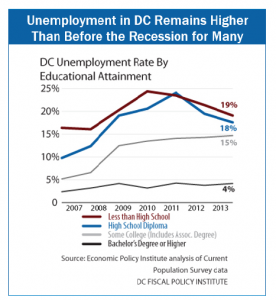DC’s economy may be well on the road to recovery from the Great Recession, but a look beneath the surface shows that many residents are being left behind. Low-wage workers have seen their wages fall, while higher-wage workers have seen earnings grow by thousands of dollars per year. And workers without a college degree continue to experience levels of unemployment — and especially long-term unemployment — that are far higher than in 2007.
While DC has a number of strengths to build on, such as the increase in the minimum wage to $11.50 an hour, our new report finds that more needs to be done to strengthen literacy and training programs to help more residents earn a living wage.
Some important findings that DC should address include:
- Improving hourly wages for low-wage workers: Low-wage workers saw their already meager wages drop 1 percent drop between 2007 and 2013, to under $13 an hour. Meanwhile High-wage workers saw a 16 percent increase in hourly wages over the same period, to $45 an hour. The gap between low and high-wages in DC is now at a 35-year high.
- Reducing unemployment among residents without a college education: Residents with some college experience, for example — including those with an associate’s degree — faced a jobless rate of almost 15 percent in 2013, nearly three times the their unemployment rate in 2007.
- Focusing on the long-term unemployed: Many workers are still struggling to get a foothold in the economy. Nearly six in 10 unemployed residents with just a high school diploma were out of work for more than six months in 2013. For Black residents, more than half of those who were unemployed were unemployed long-term. In 2007, by contrast, nearly all unemployed residents went back to work within six months.
- Getting back to full-time work: Many residents are having a hard time finding full-time jobs in DC’s recovering economy and are forced to work part-time. In 2013, more than 40 percent of part-time workers with only a high school diploma were working part-time for economic reasons.
The District has a number of strengths to build on. The city’s minimum wage will rise to $11.50 an hour in 2016, and all workers in the city earn paid sick leave starting with their first day on the job. Legislation adopted in 2014 will prohibit employers from asking about an applicant’s criminal record until a job offer has been made. And the District operates a number of training programs for adults and youth.
Yet, our report finds that the job challenges continue to be especially great for some residents, including the roughly 60,000 adults who lack a high school diploma or an equivalent, residents returning from prison, and others with limited job experience. Taking additional steps to help residents who are being left behind in this recovery is critical.
Enforcing the new wage and job benefits, raising the minimum wage for tipped workers, providing additional literacy and training programs and expanded access to quality childcare are just some of the steps DC can take to help all residents succeed.
To print a copy of today’s blog, click here.
